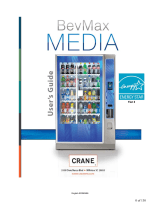
6
3. INSTALL THE G10-S Telemeter
Follow these steps to install the G10-S Telemeter in a machine:
1. Decide whether to mount the Telemeter using
the three supplied self-tapping screws (Figure
5), or with a strip of Velcro attached to the
back of the Telemeter.
2. Select a location in the main cabinet or door
where the Telemeter is accessible for service
and protected from moisture. To prevent any
water intrusion, mount the Telemeter vertically
with the cables hanging down. Make sure it
will not interfere with any moving parts and
allow for cable routing.
3. If mounting with screws, screw the self-tapping
screws into the frame of the door or machine. If
using Velcro, attach a strip of Velcro to the frame of
the door or machine and stick the Telemeter to it.
4. Connect the Magnetic Base Antennas’ (#V8W-
UP0101290) MCX connectors into the ANTENNA
ports found on the bottom of the Telemeter.
5. Place the antennas on top of, or inside the vending
machine on a metal surface no closer than 6 inches
apart. Make sure the antennas are not surrounded
by signal weakening metal support brackets or lo-
cated near the Telemeter or the control board when
the door is shut. This will improve connectivity to
the cellular tower. (Figure 6).
6. Tie the antenna cable to the nearest cable from the Telemeter.
7. Disconnect the MDB connectors in the vending machine between the machine
Control Board and the existing payment devices. Connect the MDB Cable from
the G10-S Telemeter to the MDB connectors going to the machine Control Board
and the existing payment devices. Ensure the connectors latch rmly together.*
8. Plug the 6-pin black connector from the Telemeter cable into the cable from the
Card Reader. Ensure the connectors latch rmly together.
9. Either connect the DEX cable with the standard jack plug from the Telemeter to
the vending machine DEX port (for remote DEX reporting), or leave the DEX cable
hanging loose if no remote DEX is to be used. Test all connections made.
FIGURE 5
* NOTE: When a Bill Recycler is present, the ePort must be plugged into the MDB bus
ahead of the Bill Recycler so that it can communicate properly with the VMC.
FIGURE 6
6” min














